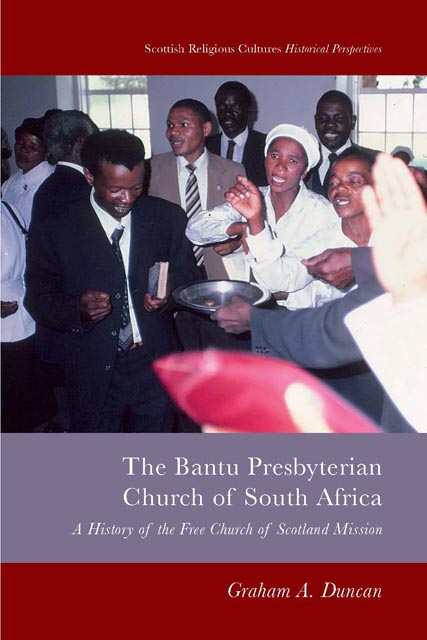Book contents
- Frontmatter
- Contents
- Acknowledgements
- Timeline
- A Presbyterian Anthem
- Introduction
- 1 Background to this Study
- 2 The Origins and Early Development of Scottish Presbyterian Mission in South Africa, 1824–65
- 3 Rev. Tiyo Soga (1829–71): A Paragon of Early Indigenous Leadership
- 4 The Role of Mission Councils in the Scottish Mission in South Africa, 1864–1923
- 5 The Rev. Edward Tsewu’s Dispute with the Free Church of Scotland Mission
- 6 The Mzimba Secession, 1898: A South African ‘Disruption’
- 7 Presbyterianism in South Africa, 1897–1923: To Unite orNot to Unite?
- 8 Preparations for the Formation of the Bantu Presbyterian Church of South Africa, 1897–1919
- 9 The Formation of the Bantu Presbyterian Church of South Africa, 1920–3
- 10 Mission to Church – Church to Mission: The First Ten Years, 1923–33
- 11 Reaching Out: The Bantu Presbyterian Church in South Africa and the Presbyterian Church of South Africa and Ecumenism, 1923–39
- 12 The Bantu Presbyterian Church in South Africa and Ecumenism, 1940–99
- 13 The End of Mission Councils: The Church of Scotland South Africa Joint Council, 1971–81
- 14 A Young Church in Mission or Maintenance Mode?: The Bantu Presbyterian Church of South Africa, 1923–99
- 15 The Bantu/Reformed Presbyterian Church and Socio-political Issues
- 16 Bantu/Reformed Presbyterian ChurchWomen in Leadership in Ministry
- Conclusion: Indigenous Presbyterians and Missionaries –Transferring Contending Roles and Responsibilities
- Bibliography
- Index
7 - Presbyterianism in South Africa, 1897–1923: To Unite orNot to Unite?
Published online by Cambridge University Press: 26 November 2022
- Frontmatter
- Contents
- Acknowledgements
- Timeline
- A Presbyterian Anthem
- Introduction
- 1 Background to this Study
- 2 The Origins and Early Development of Scottish Presbyterian Mission in South Africa, 1824–65
- 3 Rev. Tiyo Soga (1829–71): A Paragon of Early Indigenous Leadership
- 4 The Role of Mission Councils in the Scottish Mission in South Africa, 1864–1923
- 5 The Rev. Edward Tsewu’s Dispute with the Free Church of Scotland Mission
- 6 The Mzimba Secession, 1898: A South African ‘Disruption’
- 7 Presbyterianism in South Africa, 1897–1923: To Unite orNot to Unite?
- 8 Preparations for the Formation of the Bantu Presbyterian Church of South Africa, 1897–1919
- 9 The Formation of the Bantu Presbyterian Church of South Africa, 1920–3
- 10 Mission to Church – Church to Mission: The First Ten Years, 1923–33
- 11 Reaching Out: The Bantu Presbyterian Church in South Africa and the Presbyterian Church of South Africa and Ecumenism, 1923–39
- 12 The Bantu Presbyterian Church in South Africa and Ecumenism, 1940–99
- 13 The End of Mission Councils: The Church of Scotland South Africa Joint Council, 1971–81
- 14 A Young Church in Mission or Maintenance Mode?: The Bantu Presbyterian Church of South Africa, 1923–99
- 15 The Bantu/Reformed Presbyterian Church and Socio-political Issues
- 16 Bantu/Reformed Presbyterian ChurchWomen in Leadership in Ministry
- Conclusion: Indigenous Presbyterians and Missionaries –Transferring Contending Roles and Responsibilities
- Bibliography
- Index
Summary
Introduction
Racism is a pervasive and perennial problem in South Africa. This chapter will examine how opportunities aiming to build a better more inclusive South Africa at the close of the nineteenth and beginning of the twentieth centuries were squandered through racism. Racism has its roots in the economic, political and social relations between people. Biological and other theories were developed later to justify the domination of one racial group by another. Studies and research carried out in recent years have demonstrated clearly the links between colonial and economic domination and institutional domination. The racist regime of South Africa is the most extreme example of this (Sjollema 1982: 100) as it was a culturally constructed evolutionary attitude of mind based on power with tragic consequences when enacted. This developed in South Africa from the time of the settlement of Europeans, particularly the 1820s, and was manifested in the century-long wars of dispossession from late in the eighteenth century against the ‘Other’, the indigenous peoples. Exercising crude, and often violent, power was symptomatic of the hegemony of empire.
Richard Elphick makes the central claim that:
…the struggle over racial equalisation … was pivotal to South African history; that this concept was rooted in the missionaries’ proclamation of God's love to all people, as manifested in the birth, crucifixion and resurrection of Jesus; that the ideal of equality was nurtured in large part by missionary institutions, even though missionaries themselves repeatedly sought to limit, deflect or retard its achievements. (Elphick 2012: 7–8)
This was related to two main assumptions:
… that networks linking members of South Africa's disparate racial and cultural groups are not of recent origin, but go far back in South African history; and that, in seeking to understand the religious origins of apartheid historians should … see the Dutch Reformed Church as a predominantly evangelical church, closely akin to British and American Protestant churches, which was determined to shape its policies in constant dialogue with the English-speaking world. (Elphick 2012: 9)
Martin Meredith (2011: xiv) asserts that scientists have uncovered the origins of human life in Africa seven million years ago before a mass migration around 60,000 years ago which populated the rest of the world. Therefore the debate about who came first, white or black, is outdated.
- Type
- Chapter
- Information
- Bantu Presbyterian Church of South AfricaA History of the Free Church of Scotland Mission, pp. 85 - 97Publisher: Edinburgh University PressPrint publication year: 2022



